|
THE Drummonds of the Kirktoun
of Auchterarder appear to have been a troublesome family. One of them, John
Drummond, came under the notice of the Privy Council of Scotland, and he and
Duncan Neishe, Burgess of the Canongait, as his cautioner, had to grant bond
for £500 not to harm David and Robert Grahrame, sons of the late John
Grahame of Callender.
The fate of Alexander
Drummond, probably the father of John, was a tragical one. Without being a
practiser of witchcraft in the ordinary acceptation of the term, he used
unlawful arts, which brought him within the reach of the Act of Parliament
of Queen Mary, 1563. His crime appears to have been the using of charms for
curing sickness both in men and cattle, which he did openly. The Kirk kept a
careful eye over his proceedings, as we find the Kirk-Session of Perth, by
injunctions, warned the brethren to watch the sayings and doings of "Alshander
Drummond, suspected of unlawful airtes, charmes, and abuses of the people."
The attention of the Church
having been fixed upon poor Alexander, his course of mitigating or curing
the diseases of his fellow-men or their cattle was shortly thereafter
brought to a close. He appears to have been apprehended, conveyed to
Dunblane, thereafter to Tillicoultry and Stirling, probably to be confronted
with the witnesses against him. After emitting declarations at these places,
he was taken to Edinburgh, and brought to trial in the High Court of
Justiciary on 12th January, 1629, where, on 3rd July thereafter, he was
found guilty and sentenced to death, and suffered accordingly at the Market
Cross of Edinburgh.
The following is a record of
the trial, as it appears in the Books of Adjournal:—
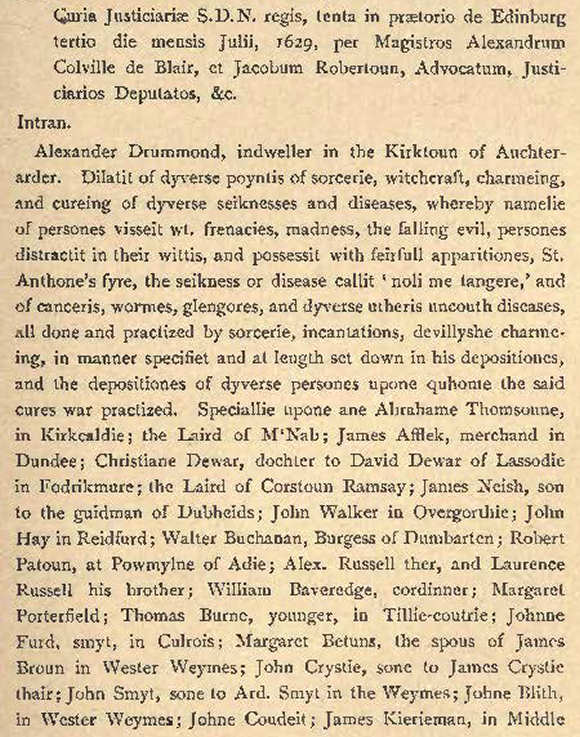
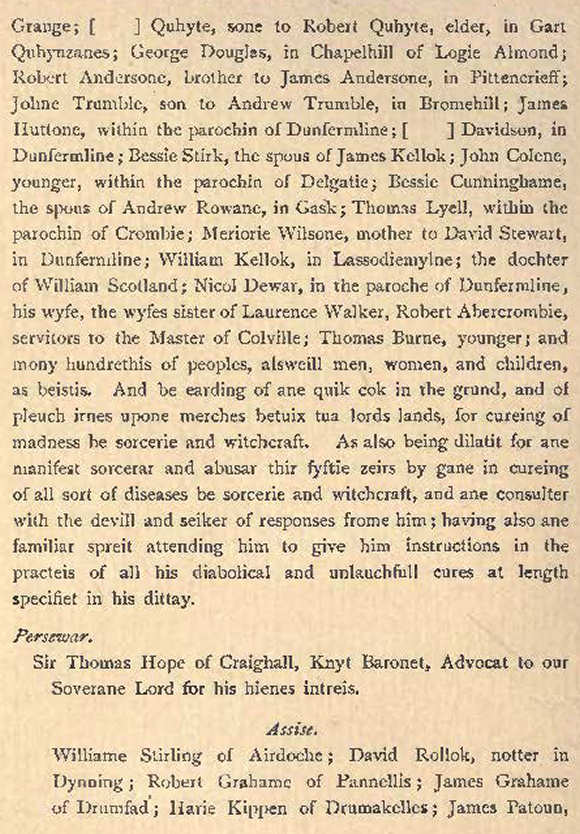
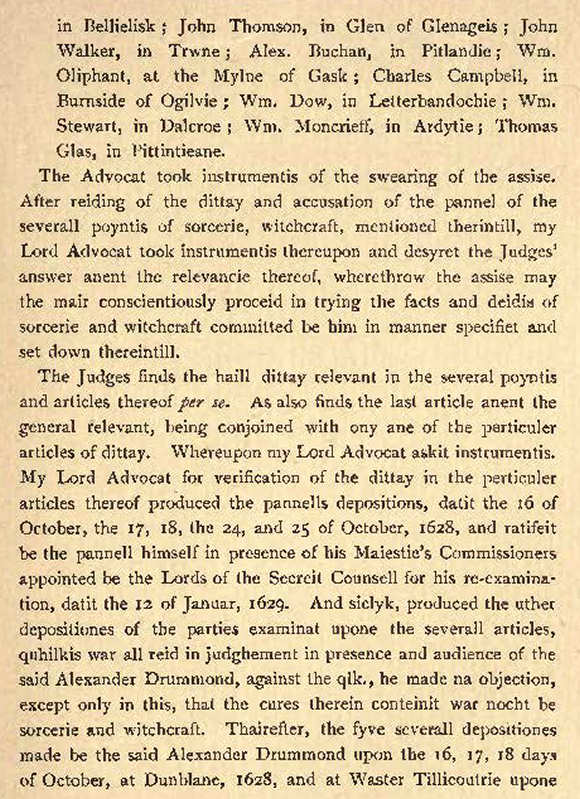
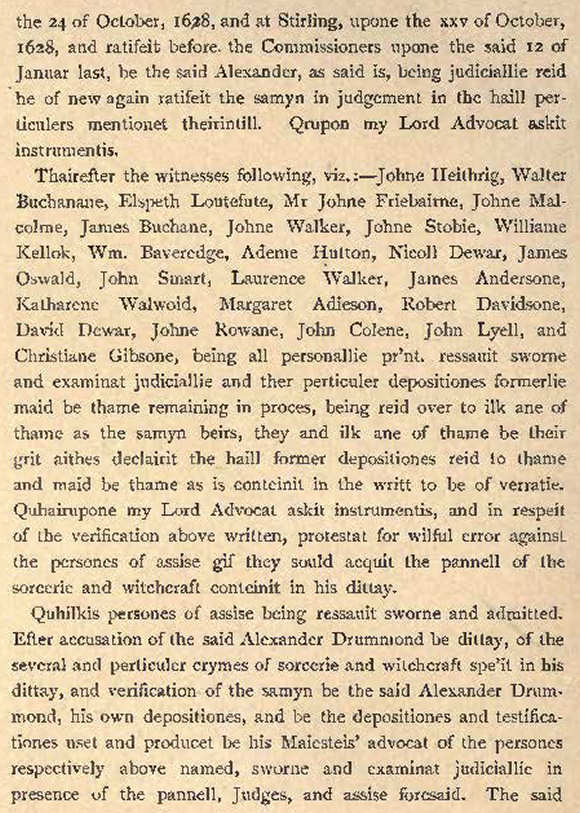
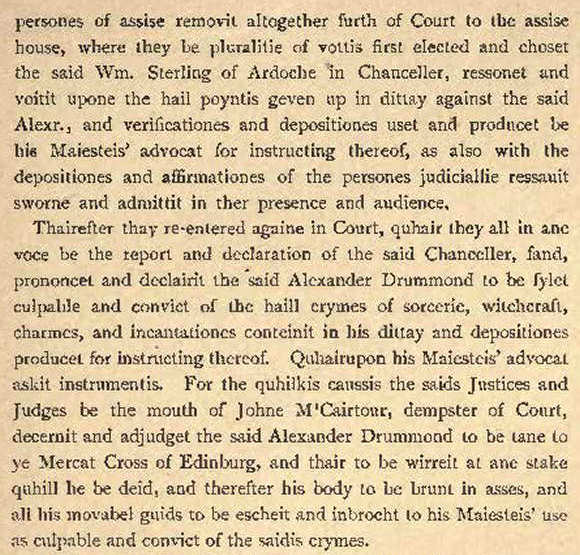
It is a matter fur
observation that the witnesses adduced against Alexander Drummond were
mostly persons in the higher ranks of life, and who lived at a distance from
him. One of the witnesses is Mr Freebairn, who was minister of Madderty from
1620 to 1657, and the father of Bishop Freebairn.
Although the trial was held
in Edinburgh, the jurymen were selected from the neighbourhood of
Auchterarder. Like those upon whom Drummond had practised his arts, they
were also of the better class, and were probably chosen as possessing higher
education and intelligence, so as to guard the accused against any rash
dealing which the nature of his alleged crimes might produce in the common
mind.
The famous Sir George
Mackenzie in his "Pleadings in some Remarkable Cases before the Supreme
Courts of Scotland," while defending a woman accused of witchcraft, refers
to the case of Drummond as having incurred his punishment for cheating the
people by his pretended cures, and not for witchcraft. He says:—"And though
our Act of Parliament punishes such as seek help by unlawful means of
sorcerers, or necromancers, yet they must first be proved to be sorcerers,
or necromancers, who make a trade of abusing of people, as that statute
says, which cannot be drawn at all to a dubious cure used in one case, and
by the application of natural means; and, therefore, though Drummond was
burnt as a witch, albeit he had never committed any malefice, but had only
cured such as were diseased, yet, having, in a long habit and tract of time,
abused the people, and used spells and incantations, which had no relation
at all to devotion; and having continued that trade, albeit he was expressly
discharged, his case was very far different from this, and deserved a far
more severe punishment. The same may be likewise answered to the
condemnatory sentence pronounced against John liurgh, who was convicted of
witchcraft in anno 1643, for pretending to cure all diseases, by throwing
into water an unequal number of pieces of money, and sprinkling the patients
with the water; so that it may be justly said that these died rather for
being public cheats, falsarii, than for being witches, venefici." |

